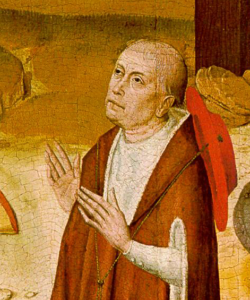Events
International Medieval Congress
Leeds, 1-4 July 2024
Call for papers
The Cusanus Society UK & Ireland is organizing sessions for the IMC Leeds 2024 (1-4 July). Topics are welcome on any facet of the life and work of Nicholas of Cusa, including reform, mysticism, philosophy, theology, exegesis, conciliarism, mathematics, perceptions of Islam, etc. We also welcome proposals that focus on the context and influences on Cusanus, as well as his influence on contemporaries and subsequent generations.
We are open to session proposals (of 3 papers) that fit these themes, as well as individual papers which we will organize into appropriate sessions. It will be possible to deliver papers virtually. Although the session submission deadline is 30 September, please submit any abstracts (100 words for a 20-minute paper) by 31 August, so that we have time to plan and organize sessions based upon the proposals received. Also, if you are willing to moderate a session, please contact us.
Please send abstracts/proposals to:
- Simon J.G. Burton, The University of Edinburgh, [email protected]
- William P. Hyland, University of St Andrews, [email protected]

